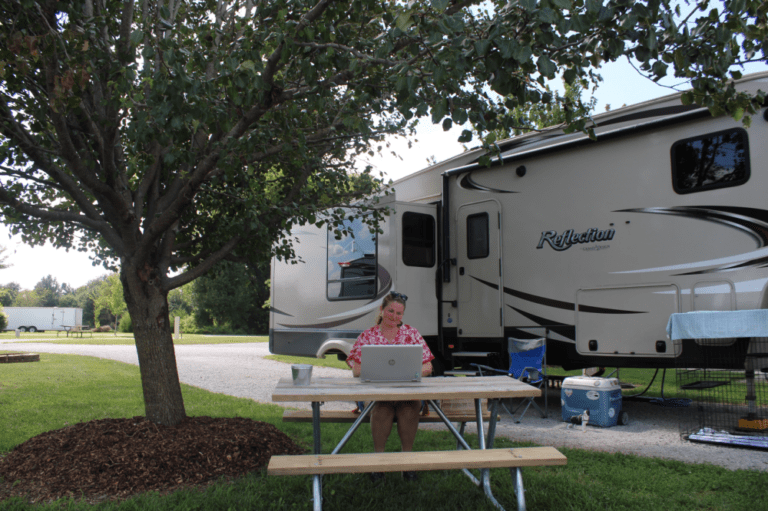This post may contain affiliate links. See our affiliate disclaimer here.
Having quality internet in your RV is essential for digital nomads who work from their computers while they travel. The three main RV internet options are public Wi-Fi, satellite internet, and mobile hotspots.
Below, we reveal the pros and cons of each option. Keep reading to discover how to get internet while living in an RV.
Contents
RV Living Internet Selection Criteria
Before diving into the RV internet options, let’s review some criteria that will help you determine which option is best for your travel needs.
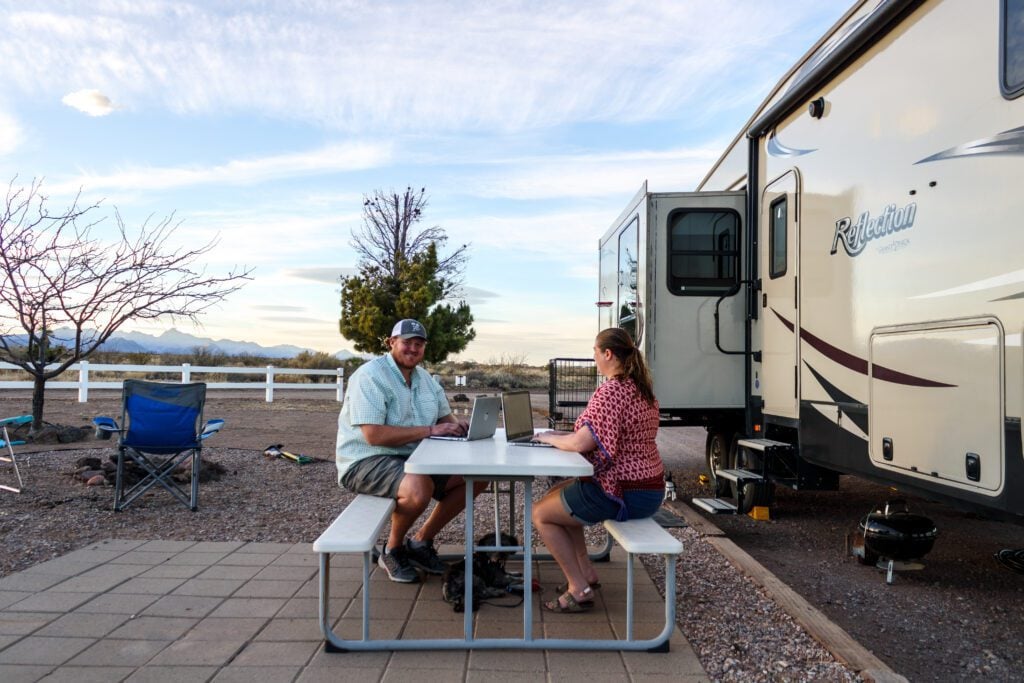
Budget
As with most purchases, the first consideration when selecting internet for RV living is budget. The cost of practical RV internet options ranges from free to thousands of dollars.
If you are able to spend more upfront, you will have more options for RV internet. On the other hand, if you are on a tight budget, your options will be limited, but it is still possible to meet your internet needs on the road.
Type of Internet Usage
The next consideration is how you will use your RV internet. If you are only using the internet for personal reasons, a less dependable solution may be acceptable.
However, if you are relying on your RV living internet solution to telecommute to a job, your internet needs to be reliable. Within each category of use, it is also important to think about your specific internet needs.
A professional who regularly uses video conferencing must have a dependable high-speed internet connection. Whereas, a self-employed digital nomad might be able to justify a less reliable solution to save money.
For personal use, those who want to stream TV may need a different internet solution than those who just want to browse the web.
Data Usage
Another important factor when selecting internet service for RV living is data usage. Many of the most popular mobile internet plans have monthly data caps. Before finalizing your RV internet selection, track your data usage for an entire month.
Track work usage, entertainment, and streaming TV separately so you have a comprehensive understanding of your data consumption. If you need to make a decision quickly, use this data usage calculator to estimate your household internet usage.
Boondocking Frequency
Before selecting your RV internet solution, it is also important to consider your camping style and planned destinations.
If you plan to spend a significant amount of time in remote boondocking locations, your internet options are going to be extremely limited. Whereas, if you plan to mostly camp at established RV parks near towns, you can consider any RV internet option.
Internet Options for RV Living
As we noted in the introduction, there are three main RV living internet options: public Wi-Fi, mobile hotspots, and satellite internet.
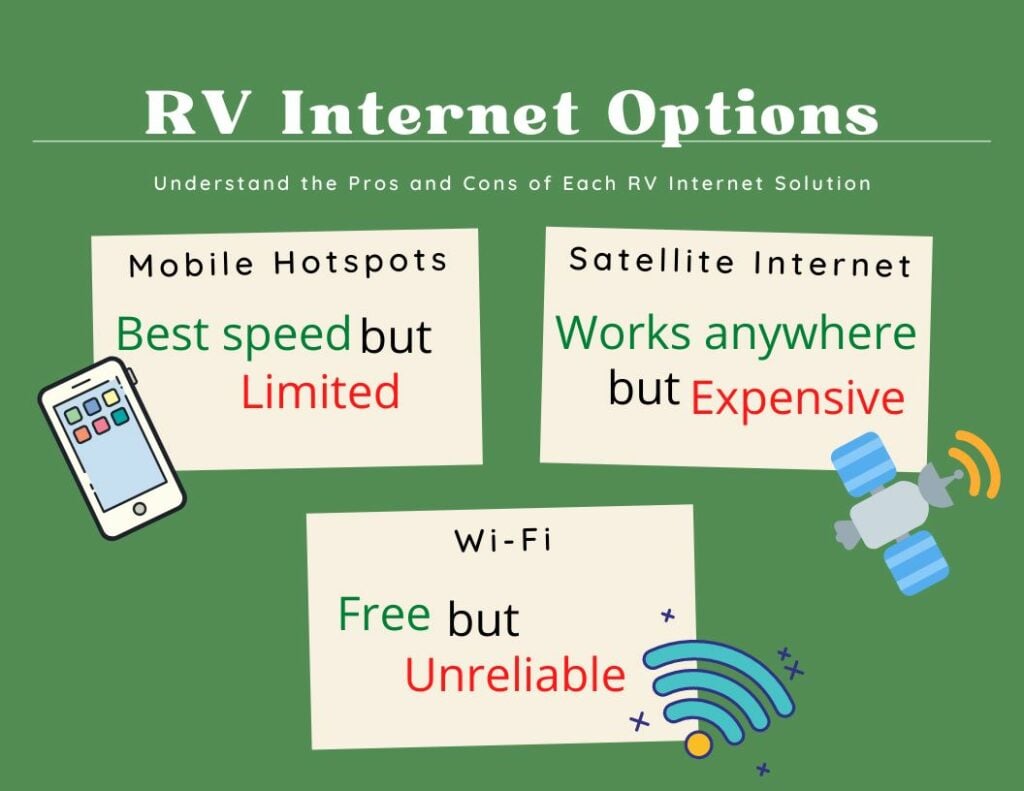
Public Wi-Fi
Overview of Wi-Fi Internet for RV Living
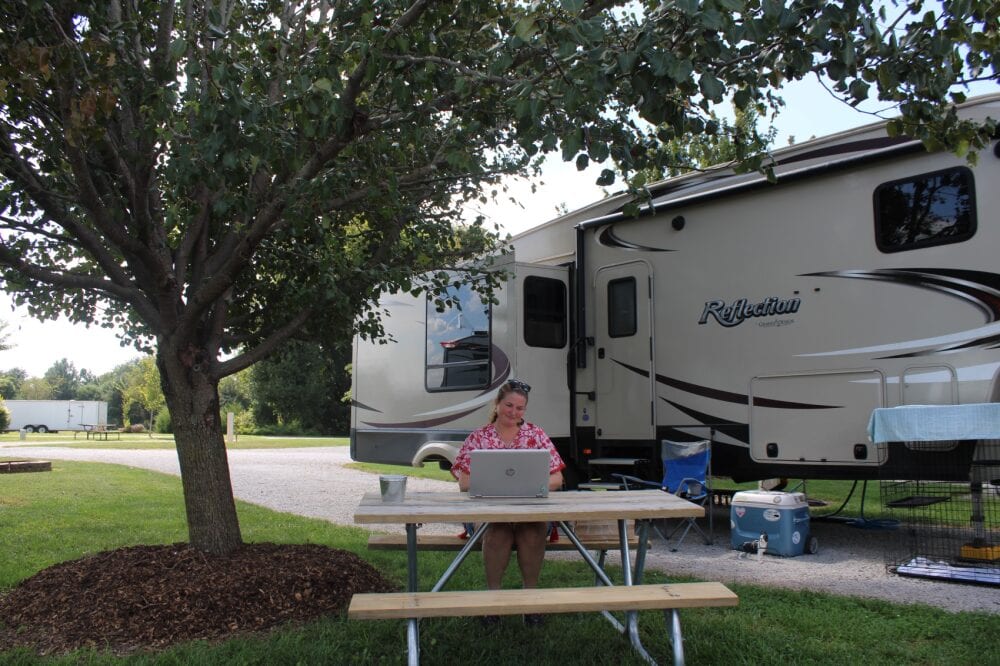
Many private campgrounds provide free Wi-Fi to anyone staying at their park. When we started living in our RV in 2016, campground Wi-Fi was a total joke. In our first few years living on the road, I don’t think we stayed at a single RV park with Wi-Fi that consistently worked.
Fortunately, the increase in young, working RVers has pushed RV parks to upgrade their internet offerings. While the quality of RV park Wi-Fi has greatly improved over the last few years, on average it is still not great.
If Wi-Fi is not available at a campground, RV campers can often find public Wi-Fi in the nearest town. Typical places offering free Wi-Fi are libraries, coffee shops, and restaurants.
The availability of Wi-Fi is expanding throughout the country, so travelers can also now find Wi-Fi in many supermarkets and town squares. Just like campground Wi-Fi, expect variable quality from any free, public internet service.
Pros and Cons of Wi-Fi Internet for RV Living
Pros of Wi-Fi
- Free
- Unlimited data
Cons of Wi-Fi
- Unreliable connections and speeds
- May have to travel away from the RV to access
Verdict on Wi-Fi for RV Internet
If you just need internet for personal use, relying on Wi-Fi at campgrounds and other public spaces is a great option. It will help you save money, and having limited internet will help you focus on enjoying the outdoors instead of streaming TV.
However, if you work from your computer full-time, we do not recommend relying solely on Wi-Fi. We recommend that working RVers pay for a more reliable RV living internet solution, especially if they telecommute and have regular video calls.
Mobile Cellular Hotspots
Overview of Mobile Hotspot Internet for RV Living
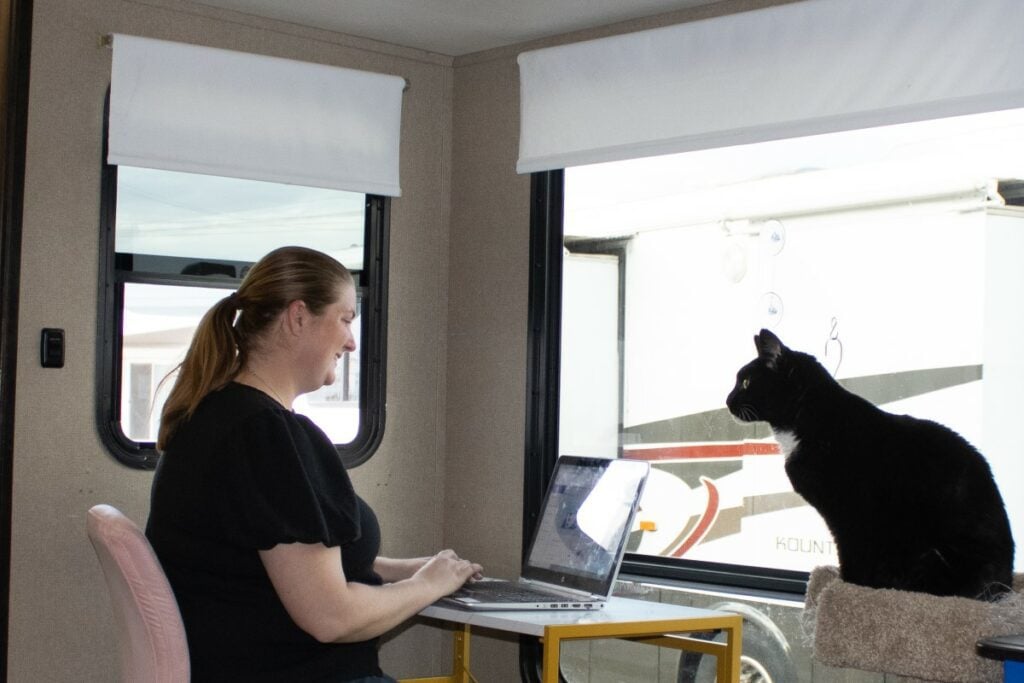
Many cellular providers offer mobile hotspots. These hotspots use cellular data service to create a wireless or tethered connection for your computer and other devices.
Mobile hotspot internet is as reliable as the cell service it is using. Therefore, hotspots typically provide reliable, high-speed internet anywhere your phone has at least a few bars. On the other hand, hotspots do not work at all when there is no cell service.
There are two options for purchasing a mobile hotspot internet plan. The first option is signing up for a cell service plan that includes mobile hotspotting. For example, Verizon’s current unlimited cell phone plans include between 30GB and 60GB of premium mobile hotspot data.
Most providers offer similar plans. Once the hotspot data cap on an unlimited data plan is reached, data speeds are reduced until the next billing cycle.
The second option for mobile hotspot internet is purchasing a portable jetpack. Jetpacks are purchased from a cell carrier, and then they can either be connected to a monthly plan or filled with prepaid data.
In terms of pricing, the cost of mobile internet for RV living depends on how much data is included and if the hotspot is included in your phone plan. Overall, cellular internet is relatively affordable.
Monthly plans with 50GB+ of hotspotting typically cost less than $100 per month per line and 50GB of prepaid data costs around $50.
To make hotspotting a more reliable internet option for RV living, many RVers choose to purchase hotspot plans from multiple carriers. This increases the number of places where cell service is available and provides a backup if one data plan is depleted.
Personally, I have a Verizon jetpack with a plan that includes 100GB of high-speed data each month and an additional 60GB of high-speed data from my phone. I also carry a prepaid T-Mobile hotspot which can be used when Verizon cell service is poor or I run out of data.
Pros and Cons of Mobile Hotspot Internet for RV Living
Pros
- Relatively affordable
- Reliable coverage across the country (in developed areas)
- Easy to purchase multiple plans to expand coverage
Cons
- Does not work in places where there is no cell coverage
- The connection may be slowed down after the data limit is reached
Verdict on Mobile Hotspot Internet for RV Living
Mobile hotspots are the best internet option for most full-time RVers. High-speed cellular service is available in most parts of the country, especially for campers with plans from multiple companies. While data is limited on most hotspots, additional data is easy and relatively affordable to obtain.
Satellite Internet
Overview of Satellite Internet for RV Living
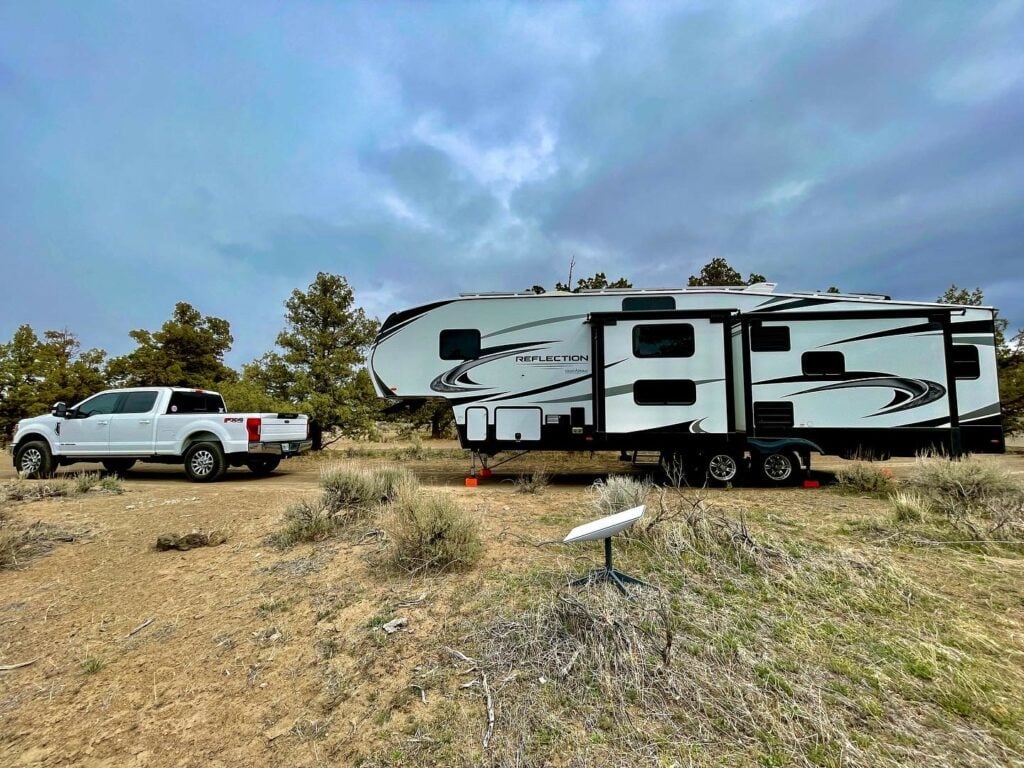
The next internet option for RV living is satellite. Satellite internet is a bit different from satellite TV. While TV satellite dishes only need to receive signals, satellite internet requires the capacity to both receive and transmit signals.
Prior to 2022, two companies were offering portable, satellite internet services for RV living: HughesNet and RVDataSat. To use satellite internet with either company, RV owners had to purchase an expensive antenna dish, which costs several thousand dollars.
However, recently a new, more affordable option has come on the market: Starlink.
Starlink Satellite Internet for RV Living
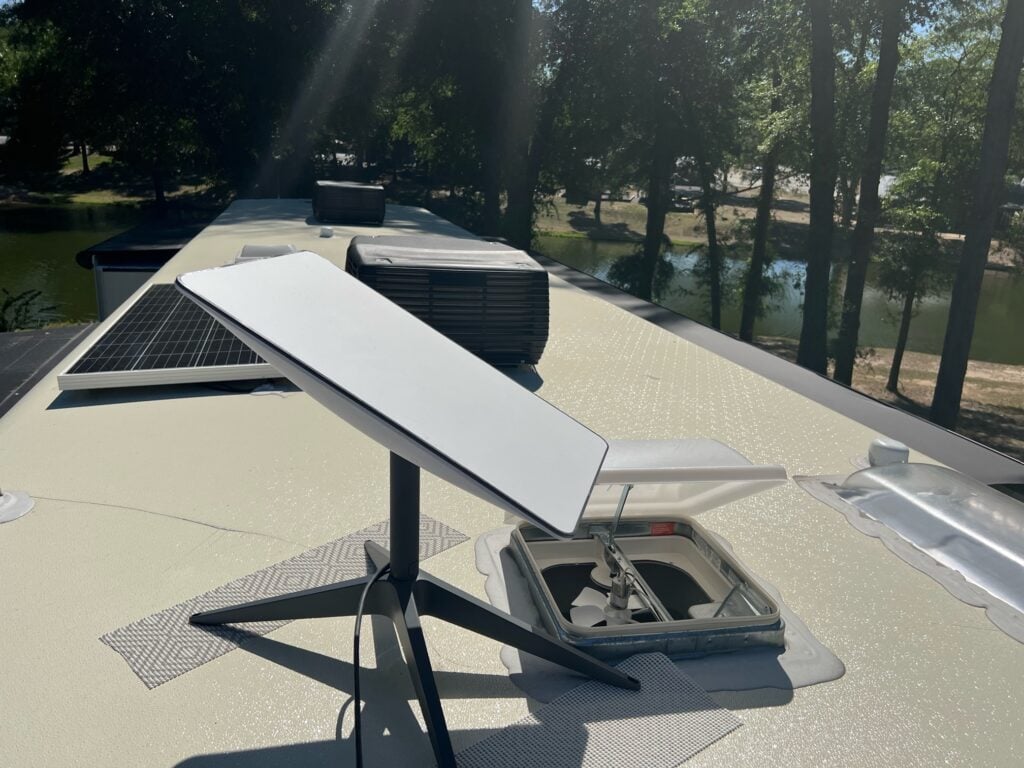
Starlink is the newest and best satellite internet option for full time RVers. Using advanced satellites in low orbit, the company can offer high-speed, low-latency broadband internet across the globe.
Starlink is also able to offer download speeds between 100 Mb/s and 200 Mb/s and latency as low as 25ms in many locations.
While many full-timers love Starlink Internet, it can be an expensive mobile internet option. Users are charged a one-time fee for their Starlink satellite equipment. The fee is $349 for a standard Starlink dish or $499 for a mini Starlink dish that can be permanently installed on your vehicle.
The Starlink ROAM unlimited service plan is $165 per month and includes unlimited data. The $165 plan includes service anywhere within your country. The ROAM plan also includes in-motion use, so your passengers can have internet while you are driving.
More recently Starlink has added a more budget-friendly ROAM plan that includes 50GB of data for $50 per month. This data limit may be fine for weekend campers, but would not be enough for most digital nomads.
However, Starlink ROAM users are able to pause their service at any time, so RVers are not billed for months when they are not using their service. The service should work in most locations in the United States, but speeds will vary depending on usage and satellite availability in the area.
As with all satellite internet options, Starlink will only work if the dish has a clear view of the sky.
Pros and Cons of Satellite Internet for RV Living
Pros
- Works anywhere with a clear view of the sky
- Unlimited use without data caps
Cons
- Expensive
- Requires purchase of a satellite dish
Verdict on Satellite Internet for RV Living
With the launch of Starlink, satellite internet is now a great option for RV living if you are willing to pay for it. We would recommend that Starlink users also have a mobile hotspot for areas where a clear view of the sky is not possible.
Other RV Internet Options
Outside of the mobile internet options, we have detailed there are a few other internet options that may work for some RV campers.
Home Internet Services
If your RV is stationary, you can sign up for a home internet plan to use in your RV. Some RV campgrounds have hard-wired internet pulled through to each site, so RVers can sign up for internet and cable plans with the local carrier.
If the RV park does not have wired internet available, stationary campers can purchase a home internet plan through any of the major cell carriers.
While home internet plans through cellular carriers are designed to be used in a fixed location, some RVers have traveled with home internet and found that location restrictions are not strongly enforced.
T-Mobile offers an RV internet plan that allows travelers to take a Wi-FI gateway on the move. However, at $110 per month for 200GB this plan is significantly more expensive than their home internet solutions>
Co-Working Spaces
For digital nomads who want high-speed internet and a professional workspace, a co-working space can be a great solution. Use CoworkingCafe to find an open desk near your campsite.
Thanks for reading our guide to internet options for RV living. We hope you have a better understanding of how to stay connected while traveling around.
For more RV life tips, see our complete guide to full time RV living.
Happy Camping!

Christina Pate is a seasoned full-time RVer who, along with her husband Justin, has journeyed across the US, Canada, and Mexico. Drawing from her extensive travels, RV repairs and RV renovations, she founded Travels with Ted to guide and inspire fellow RV enthusiasts. Christina is also the co-author of The Owner’s Guide to RV Maintenance and the creator of My RV Log Book.

